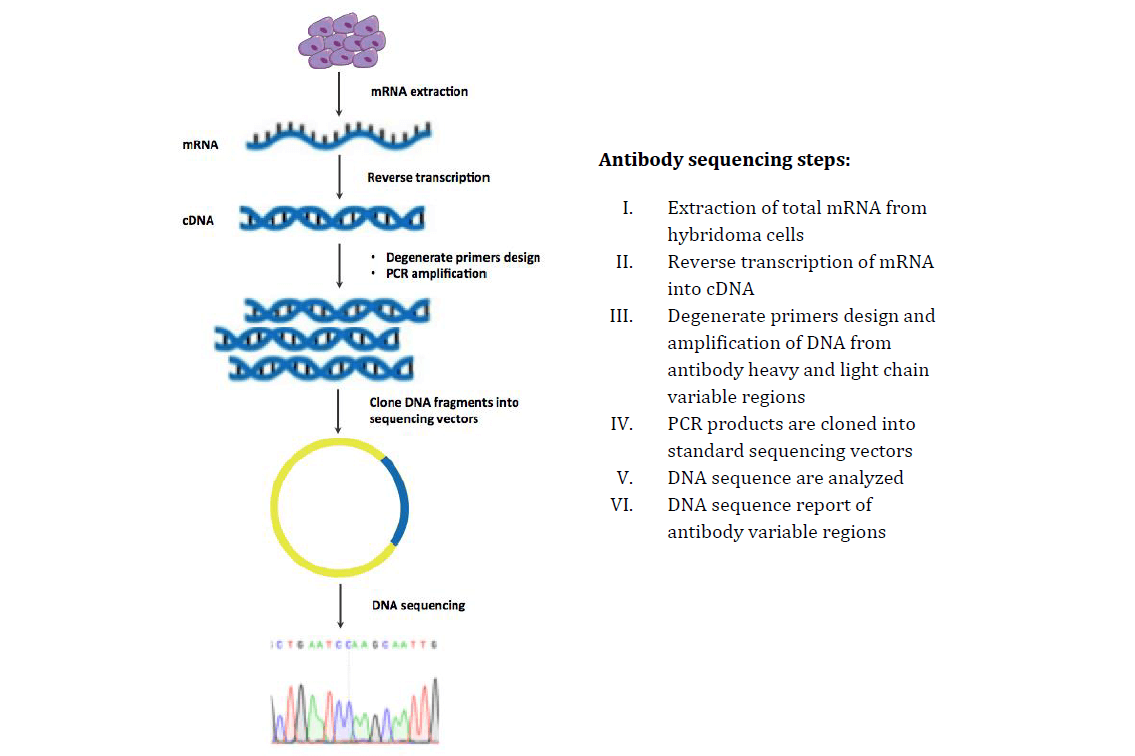PCR based Antibody Sequencing
- Development of antibody drugs: The antibody sequence can be obtained through sequencing to provide basic data for the development of antibody drugs.
- Study of immune response process: By sequencing, we can understand the mutation and evolution of antibodies, providing data support for studying the immune response process.
- Submit B cell samples, quantity>10^6.
- Samples are stored in liquid nitrogen, and low temperature must be maintained during transportation.
During the immune response, B cells produce antibodies with specific antigen-binding sites that can specifically bind to antigens. This process involves a series of gene rearrangements and mutations, which make the antibodies diverse. PCR-based antibody sequencing mainly uses PCR technology to amplify the mRNA of the heavy and light chains of antibodies, and then sequences the amplified products. By analyzing the sequencing data, we can deeply study the diversity of antibodies, not only the gene sequence of antibodies, but also the mutation and evolution of antibodies.
Services at MtoZ Biolabs
MtoZ Biolabs has developed an innovative workflow for antibody sequencing that utilizes PCR technology, incorporating the design of degenerate primers. This PCR-based approach offers a cost-effective and time-efficient alternative to mass spectrometry-based antibody sequencing methods. Specifically, degenerate primers targeting the framework 1 (FR1) regions are employed to amplify the variable regions of the immunoglobulin (Ig) light and heavy chains from mRNA extracted from hybridoma cells. We provide a comprehensive service package that addresses all aspects of antibody sequencing required for your research projects. Simply send us your hybridoma cells, and our team will conduct a thorough analysis encompassing all necessary experimental steps.
1. Template preparation: Capture B cells and obtain mRNA.
2. PCR amplification: Design specific primers to amplify the heavy and light chains.
3. Sequencing: Sequence the PCR products.
4. Data analysis: Analyze antibody sequences through bioinformatics methods.

Service Advantages
1. Based on PCR technology, a large number of products can be amplified from a small amount of template, so it has high sensitivity.
2. By designing specific primers, the target area can be accurately amplified to reduce non-specific amplification.
3. Not only can the sequence of the antibody's structural domain be obtained, but also the constant region sequence can be obtained, which can fully understand the sequence information of the antibody.
4. By comparing the antibody sequences at multiple time points, the mutation and evolution of antibodies can be studied.
Applications
Sample Submission Requirements
Deliverables
1. Amplified DNA Fragments of Light and Heavy Chain Variable Regions (Optional)
2. Experimental Procedures and All Reagents
3. DNA Sequencing Results
4. DNA Sequence Alignments of Heavy and Light Chain Variable Regions
5. DNA Gel Images
6. Analytical Raw Data Files
How to order?







